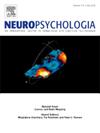神经调节与tDCS对发展性阅读障碍的有效性:一项随机、双盲、对照临床试验
IF 2
3区 心理学
Q3 BEHAVIORAL SCIENCES
引用次数: 0
摘要
关于经颅直流电刺激(tDCS)在阅读困难儿童中的应用,结果是有希望的,但也不明确。本研究旨在探讨tDCS是否会提高阅读障碍儿童的阅读技能,以及这种效果是否持久。采用随机、双盲、假对照临床试验。40例发展性阅读障碍儿童在颞顶叶皮层上接受12次20分钟的左阳极右阴极tDCS,电流为1ma。阅读任务(低高频单词、非单词、不规则单词和文本阅读错误)被用作结果测量,并在治疗前、治疗后和干预后一个月收集。并对tDCS的安全性进行了评价。在活跃tDCS组中,低频和非单词阅读的平均得分和文本阅读错误在治疗后立即和一个月显著改善,与假tDCS相比。在高频和不规则单词阅读方面,活动和假tDCS在测试后和随访时无显著差异。我们的研究结果可能为发展性阅读障碍儿童的行为康复提供一个框架。本文章由计算机程序翻译,如有差异,请以英文原文为准。
Effectiveness of neuromodulation with tDCS on developmental dyslexia: A randomized, double-blind, controlled clinical trial
Regarding the utility of transcranial direct current stimulation (tDCS) in dyslexic children, the results are promising but also ambiguous. The present study aimed to investigate whether tDCS would enhance the reading skills of dyslexic children and whether the effect is long-lasting.
A randomized, double-blind, sham-controlled clinical trial was used. Forty children with developmental dyslexia received twelve 20-min left anodal right cathodal tDCS set at 1 mA over the temporo-parietal cortex. Reading tasks (low and high-frequency words, non-words, irregular words, and text reading errors) were used as outcome measures and collected before treatment, after treatment, and one month after intervention. The safety of tDCS was also evaluated. In the active tDCS, the mean scores of low-frequency and non-word reading, and text reading errors were significantly improved immediately and one month after the treatment, compared to the sham tDCS. Concerning high-frequency and irregular word reading, there were no significant differences between the active and sham tDCS at post-test and follow-up. Our findings might provide a framework to facilitate behavioral rehabilitation in children with developmental dyslexia.
求助全文
通过发布文献求助,成功后即可免费获取论文全文。
去求助
来源期刊

Neuropsychologia
医学-行为科学
CiteScore
5.10
自引率
3.80%
发文量
228
审稿时长
4 months
期刊介绍:
Neuropsychologia is an international interdisciplinary journal devoted to experimental and theoretical contributions that advance understanding of human cognition and behavior from a neuroscience perspective. The journal will consider for publication studies that link brain function with cognitive processes, including attention and awareness, action and motor control, executive functions and cognitive control, memory, language, and emotion and social cognition.
 求助内容:
求助内容: 应助结果提醒方式:
应助结果提醒方式:


